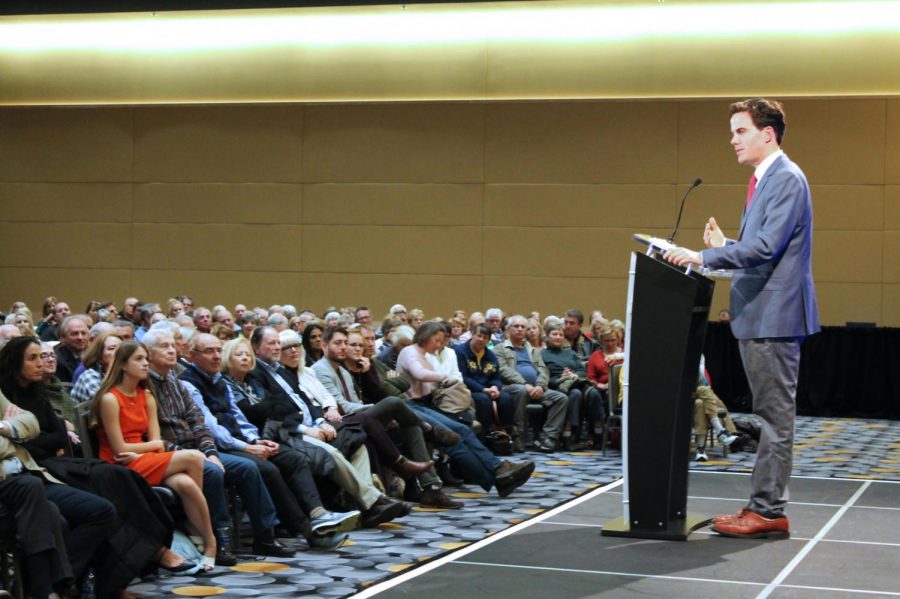Midterm election analysis
Political reporter analyzes trends, midterm results at Sinai Forum
Robert Costa speaks to a packed room at the Nov. 11 Sinai Forum.
Robert Costa, political reporter for the Washington Post and host of the PBS program “Washington Week,” explained how his reporting has previewed developments in national politics during his speech, “Understanding the Midterm Elections,” at the Sinai Forum on Sunday, Nov. 11.
Costa analyzed how the United States’ midterm elections on the previous Tuesday had brought out the largest amount of voters in a midterm in 100 years. Instead of a nationwide trend in one direction, the bases of both parties showed more intense support for their side. The Republicans gained seats in the U.S. Senate, but the Democrats gained control of the U.S. House of Representatives. There is also a big divide between the political choices in rural and urban areas.
“After Tuesday, we are a nation divided,” Costa said.
After Costa earned his master’s degree in politics from Cambridge University in 2009, he began working for the National Review, a conservative magazine. He convinced the National Review that he would be a reporter, not a conservative commentator.
He developed sources in the world of conservative politics.
“I covered the fringe of the fringe of the fringe, and now they’re running the government,” Costa said.
Although he advises people to assume nothing when it comes to politics, Costa said some developments he saw building were the popularity of Trump with Republicans and the populism and nationalism represented by people like Steve Bannon, Trump’s former political strategist.
Costa covered Trump at the Conservative Political Action Conference in 2011, when Trump was promoting “birtherism,” or skepticism regarding the authenticity of President Barack Obama’s birth in the United States. Costa noted how Trump played to the conservative audience.
“They didn’t care what he said about birther stuff,” Costa said. “What mattered was that Trump was taking on the establishment.”
He’s covered Trump many times since, and learned how accessible he is. Trump had discovered how guarded the other politicians are and was using that to his advantage.
Similarly, he covered the opening of a movie about Sarah Palin, directed by Steve Bannon, in 2011. He met with Bannon in a coffee shop in Iowa. Costa noted how Bannon said the middle class was destroyed, that President George W. Bush failed, and Obama would fail and that American politics were headed toward nationalism.
Costa said similar concerns of populism and inequality are arising in the Democratic party, describing the Democratic party’s internal struggle as underreported. People he mentioned as possible presidential candidates for the Democrats in 2020 were former Vice President Joe Biden, U.S. Senator Kamala Harris and former New York City Mayor Michael Bloomberg.
Costa emphasized how his career has influenced his outlook.
“I’ve had a front-row seat to history these last 10 years,” Costa said. “I promise you, I will continue to assume nothing.”
Robert Schmuhl, chair emeritus in American studies and journalism at the University of Notre Dame, had Costa as a student when he was an undergraduate. Schmuhl said Costa is well prepared by his interest in both history and politics.
Schmuhl said he agrees that U.S. politics today are very unpredictable. Schmuhl said much of his work deals with how media and personality interact with politics.
“The election of Donald Trump illustrates the principle that a strong personality is today more important than party experience,” Schmuhl said.



Daniel L Schmidt • Nov 13, 2018 at 12:23 am
Bob Costas is an informed observer of what is going on in Washington. In the round table discussions he leads out with a provocative question and if he thinks their leaving something out he’ll followup with a targeted question leading to an area he feels should be expanded on eliciting at times their opinion. I enjoy the show and will mine in to older episodes, but he still looks like the smartest kid in class.